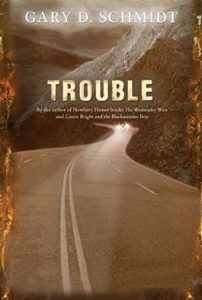For Henry Smith, the young protagonist of Gary D. Schmidt’s novel, trouble is synonymous with pain. Pain comes from the loss of a loved one, from a desire for revenge, and from the realization that there is more to Henry’s trouble than meets the eye.
 Henry is an adolescent schoolboy living in a coastal New England house built by his ancestors three centuries ago. The family is comfortable and safe, their lives predictable, until trouble appears in an accident involving Henry’s older brother. Subsequent events prompt Henry to embark on a mission to climb a formidable mountain, accompanied by his best friend Sanborn, a Cambodian immigrant, and a jolly but destructive dog.
Henry is an adolescent schoolboy living in a coastal New England house built by his ancestors three centuries ago. The family is comfortable and safe, their lives predictable, until trouble appears in an accident involving Henry’s older brother. Subsequent events prompt Henry to embark on a mission to climb a formidable mountain, accompanied by his best friend Sanborn, a Cambodian immigrant, and a jolly but destructive dog.
The journey takes them northward through a summer landscape that the author paints with majestic words: “They passed stands of maples with boldly green leaves, and bright quivering aspens, and wispy white birches, and pines looking proud of their sturdy winter endurance.” Along the way they encounter other characters, some kindly, some menacing, all of whom deepen the richness of the boys’ experience.
Trouble is a perfect blend of pathos and humor. As Henry struggles with emotions ranging from grief to racial bigotry, Sanborn keeps him off balance with the kind of wry criticism that one would accept only from a close friend. It is a relationship reminiscent of Gene and Phineas, the schoolboys of John Knowles’s classic, A Separate Peace. In time, Henry discovers that the bitter circumstances of his family’s loss are not what they seem to be.
Schmidt proves once again that characters and their relationships are the core elements of great writing. With economical yet eloquent words, he pulls us into Henry’s world and into his heart. I highly recommend this five-star novel to all readers who love stories about personal growth.
Trouble contains a few racial slurs characteristic of the post-Vietnam War period. There are no instances of foul language or any sexual references.

